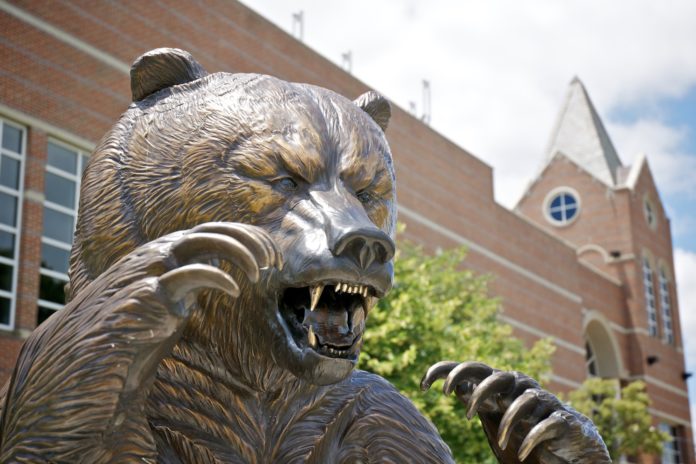MACON — Mercer University’s debate program is arguably the University’s first intercollegiate sport, evolving from a group of debate societies that began just months after the University was founded. It developed into a traveling debate squad that matched up with, and won, contests against the University of Georgia in the late 1890s. Though today’s debates are a far cry from those “oratorical contests,” today’s team hopes to become a greater force in intercollegiate debate.
The University is redoubling its efforts in debate, adding a full-time coach who will focus on training the current team, as well as recruiting new members from Georgia’s high school debate teams. The coach is James Stanescu, a former state champion high school debater in Georgia and an assistant coach to the national championship debate teams at Binghamton University.
Stanescu will focus on working with the current debate team to improve team members’ skills, while also helping to find new students who might be interested in the program. The task of adding new debaters has been made easier by a change implemented three years ago, switching Mercer’s team from a policy debate focus to a parliamentary debate emphasis. For more than 50 years, the team competed in policy debate, a form of debate in which teams compete for the entire year of competition on a single topic and where they are judged not only on oratorical skill and argument, but also the depth of knowledge. Policy debate was less accessible for students who had not been exposed to debate in the past, meaning that it was difficult to start debating in college.
In contrast, parliamentary debate is focused on broad knowledge and is based on formulations of arguments and delivery, with a more back-and-forth style and less in-tournament preparation. The faster pace leads to faster tournaments and has led to parliamentary debate growing around the country and around the world. Policy debate is almost exclusively North American, but parliamentary debate has a number of international competitors, even though all competitions are in English, with categories for English and English-as-a-Second-Language. So Mercer’s teams could eventually compete for world championships.
“We made that change because it was a more open form. At Mercer, we’ve always had strong debate programs, and we didn’t want to exclude great students, just because they weren’t exposed to it in high school,” said former debate coach Dr. Kevin Cummings, who is an associate professor of communication and theatre arts.
The University has had debate on campus since its founding in Penfield more than 178 years ago, with debate societies springing up on campus and debating one another. In addition, the University’s orators won debating and speech competitions with competitors among other schools in Georgia and around the country. The Mercer University Oratorical Association was organized in 1897 to compete in intercollegiate debates and won a number of debate contests around the state. In 1898, Mercer’s champion orator, John Roach Straton, won the first Intercollegiate Oratorical Championships in Atlanta. Debate continued to be a signifigant intercollegiate sport for many years after that, with Walter F. George, namesake of Mercer’s law school, leading a team to victory over the University of Georgia at the Mercer-Athens Debate in 1899. Following the World Wars, Mercer debate enjoyed another resurgence, with a team in 1951 taking the Wachtel Award for legislative speaking at the National Tau Kappa Alpha Debating Tournament and Conference.
The University has had success in more recent times, climbing in rankings for periods since the 1970s, including top 64 showings in 2005 and 2008. Now, Stanescu hopes to build on that reputation, from recruiting top high school debaters, to working with Mercer’s debaters to earn spots in national and international competitions.
“Georgia is a great state for debate, and Mercer has been a part of it for a long time,” Stanescu said. “We want to continue that tradition, and add to it.”
About Mercer University
Founded in 1833, Mercer University is a dynamic and comprehensive center of undergraduate, graduate and professional education. The University enrolls more than 8,200 students in 11 schools and colleges – liberal arts, law, pharmacy, medicine, business, engineering, education, theology, music, nursing and continuing and professional studies – on major campuses in Macon, Atlanta and Savannah and at three regional academic centers across the state. Mercer is affiliated with two teaching hospitals — Memorial University Medical Center in Savannah and the Medical Center of Central Georgia in Macon, and has educational partnerships with Warner Robins Air Logistics Center in Warner Robins and Piedmont Healthcare in Atlanta. The University operates an academic press and a performing arts center in Macon and an engineering research center in Warner Robins. Mercer is the only private university in Georgia to field an NCAA Division I athletic program. For more information, visit www.mercer.edu.
— 30 —










